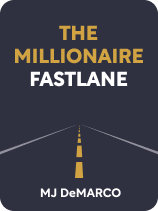

This article is an excerpt from the Shortform book guide to "The Millionaire Fastlane" by MJ DeMarco. Shortform has the world's best summaries and analyses of books you should be reading.
Like this article? Sign up for a free trial here .
What’s the traditional formula for wealth? Does the formula work? What uncontrollable factors doesn’t it account for?
In The Millionaire Fastlane, multimillionaire entrepreneur and investor MJ DeMarco challenges conventional wisdom about how to create wealth. He says that the traditional formula for wealth—getting a stable job and investing—may work, but it’s not necessarily going to make you happy.
Here’s why you should re-think your financial plan.
Hopeful Accumulation
DeMarco defines the Hopeful Accumulation formula for wealth as: job + market investments = restricted income and a mediocre retirement. According to him, hopeful accumulators follow popular methods touted by financial advisors as a guaranteed path to a comfortable retirement: Get an expensive education, work hard for 40 to 50 years, sacrifice pleasures, budget every cent, buy a house, and funnel all surplus money toward pensions, safe investments, and savings accounts.
(Shortform note: It may be confusing that DeMarco opposes the methods outlined in this formula, only to later note that they’re excellent ways to promote financial discipline. To clarify, his argument is that relying solely on these methods won’t guarantee wealth—they should only be used as part of a plan to create wealth. We’ll explore his ideas about this in Formula #3.)
Sacrificing Time and Money Creates the Illusion of Control
DeMarco argues that this formula for wealth severely limits your chances of creating wealth because it’s entirely dependent on a number of factors that you can’t control: the value of your education, the time you spend working, the economy, interest rates, and your health and well being. Let’s explore these factors in detail:
Uncontrollable Factor #1: The Value of Your Education
DeMarco claims that investing time and money in an expensive education limits your freedom in two distinct ways: First, it forces you to work so that you can pay off your debts—while your education may increase your salary by 20%, the debts you incur will take more than 20 years to pay off. Second, it shackles you to a specific type of work that “justifies” your education. This limits your financial freedom, as the value of your education depends on the opportunities in your field—if there are no opportunities, your education has no value.
(Shortform note: With the dramatic rising cost of education (200% in the past 20 years), DeMarco’s warning against taking on student debt is worth considering. Employment experts further complicate the issue: While they argue that not having a college degree lowers your chances of getting a well-paid job, they also assert that a degree doesn’t offer a competitive advantage—degrees are common, so yours doesn’t differentiate you from other job seekers. These experts suggest that supplementing your degree with practical skills that align with your intended career will give you a competitive edge.)
Uncontrollable Factor #2: The Time You Spend Working
DeMarco explains that relying on an hourly wage or salary from your job or business puts a cap on how much you can earn because time is limited: For hourly wages, you can’t work more than 24 hours a day to increase your income. For annual salaries, you can’t work above your life expectancy to accumulate more money.
(Shortform note: In Secrets of the Millionaire Mind, Eker suggests that you surpass this limit by opting to receive commission for the value you produce. Robert Kiyosaki (Rich Dad Poor Dad) explains how this works: When you work for an employer, you’re only paid a fraction of your generated value. For example, you earn $20 an hour working 40 hours a week—$800 a week. However, your work generates $5,000 in sales for your employer per week. If you ask for a 25% commission, you’ll receive $1,250 a week (a $450 increase). Unlike standard wages, the more sales you generate, the more income you receive. Since you can theoretically generate infinite sales, your income is no longer capped.)
Uncontrollable Factor #3: The Economy
DeMarco notes that the economy is volatile—an unexpected downturn can significantly impact your ability to receive a consistent income. If you lose your job or business, you won’t be able to make regular contributions to your pension and investment accounts, clear your debts, or pay your mortgage.
(Shortform note: While you can’t control the economy, there are a number of practical ways to prepare for unexpected downturns and secure your financial future: Cut unnecessary expenses, clear your debts (including your student loan and your mortgage), create and grow an emergency fund by investing in high-interest savings accounts, and look for additional ways to diversify your income instead of depending on a single source.)
Uncontrollable Factor #4: The Markets
DeMarco argues that the compound interest you earn on investments relies on three factors to effectively increase your net worth: time, regular contributions to your account, and a high rate of return. He explains that in theory, investments create wealth by providing a predictable and healthy rate of return over the course of decades.
In reality, however, the rates are too low to make a significant impact on the small, capped sums of money the government allows you to contribute to your investment accounts. You also can’t guarantee that financial managers won’t make poor decisions that lose you money or that the rate of inflation won’t reduce the value of your hard-earned money by the time you retire.
Further, DeMarco argues that you can’t rely on your home equity to increase your net worth because real estate values don’t always rise.
(Shortform note: Ramit Sethi (I Will Teach You to Be Rich) provides additional insight on why you shouldn’t think of your home as an investment: Owning property incurs additional expenses such as insurance, property taxes, and maintenance fees. These costs make it difficult for you to profit from your home equity.)
| You Can Control the Health of Your Investments Financial advisor David Bach (The Automatic Millionaire) offers a contrasting perspective on the markets DeMarco discusses here. Bach first explains that you’ll earn far more from investing small amounts of money than from not investing at all—the impact isn’t insignificant, as DeMarco suggests. Then, he suggests that diversifying your investments (by putting money into a combination of cash, bonds, and stocks) ensures the overall health of your investment portfolio, even when faced with unstable interest and inflation rates. Further, Bach claims that anyone can learn how to automate and manage their own investments, so you don’t even need a financial advisor to manage your money. This means you won’t risk someone making bad decisions on your behalf. Bach also insists that buying a home increases your financial security because, over the long term, the value of real estate investments always increases (the average annual return since 1968 is 5.3%) and outweighs your costs. |
Uncontrollable Factor #5: Your Health and Well-Being
DeMarco warns that working long hours for the hope of a prosperous future negatively impacts your health, relationships, and feelings of freedom. Even if you’re happy to make these sacrifices for now, you can’t guarantee that they’ll pay off. You may not be healthy enough to work for your income until retirement, or, by the time you retire, you may feel too old or have too many health problems to enjoy your money.
(Shortform note: While it’s sometimes difficult to find the perfect work-life balance, DeMarco’s formula assumes that hopeful accumulators neglect their health, personal lives, and gratification in favor of an uncertain financial future. However, this assumption glosses over the very feasible practices of choosing a well-paid job that satisfies you and setting boundaries around your work hours. Both methods help you make time for your overall well-being and your loved ones while also earning a comfortable living—ensuring that you enjoy good health and happiness both in the present and once you retire.)
Financial Outcome: You Might Get Rich but You Won’t Be Able to Enjoy It
DeMarco argues that committing to lifetime employment, delaying gratification, and waiting decades for compound interest to accumulate won’t guarantee a wealthy retirement—the plan relies on numerous factors that are out of your control. Further, he asserts that sacrificing your time, freedom, and pleasures isn’t worth the effort since you’ll be too old to enjoy your wealth, and inflation will reduce the value of any money you do manage to accumulate.
(Shortform note: DeMarco’s conclusion about this financial formula has two limitations. First, perhaps this formula can’t guarantee a healthy and wealthy retirement—but that’s the case no matter what route you take. Even if you choose another formula, you simply can’t predict the future. Second, DeMarco’s warning against this formula doesn’t acknowledge how it can improve the quality of your life here and now. A recent study revealed that people who delay gratification in favor of saving for the future tend to enjoy more happiness and satisfaction than those who don’t—taking proactive steps to secure your financial security increases your peace of mind and decreases feelings of anxiety about what may happen in the future.)

———End of Preview———
Like what you just read? Read the rest of the world's best book summary and analysis of MJ DeMarco's "The Millionaire Fastlane" at Shortform .
Here's what you'll find in our full The Millionaire Fastlane summary :
- The three formulas that all conventional financial strategies follow
- Why these formulas represent shortcuts that don’t guarantee financial freedom
- How to generate a massive income in a short time






